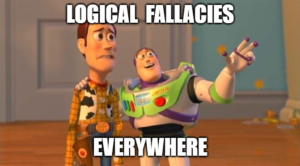
In the realm of rhetoric and critical thinking, the term “non sequitur” stands as a sentinel of logical coherence. A phrase that may initially evoke a sense of perplexity, “non sequitur” encapsulates a concept fundamental to understanding fallacies and flawed reasoning. So, let’s delve into the intriguing world of this logical anomaly and explore its significance.
At its core, a non sequitur is a Latin phrase that translates to “it does not follow.” Within the realm of argumentation, it refers to a statement or conclusion that does not logically follow from the premises or evidence presented. In other words, it’s a statement that, despite being connected to the preceding information, fails to provide a valid or reasonable inference.
Imagine a conversation where someone asserts, “The sky is blue, therefore, I like ice cream.” The connection between the color of the sky and one’s ice cream preferences lacks logical coherence—it’s a classic example of a non sequitur. The two statements are unrelated and do not form a sound basis for drawing a conclusion.
The deceptive allure of non sequiturs lies in their superficial plausibility. They often mask themselves within arguments, tricking unsuspecting minds into accepting them as valid deductions. This can result from a failure to establish a clear logical connection between premises and conclusions, leading to erroneous beliefs or conclusions.
Non sequiturs manifest in various forms, from the overtly absurd to the subtly misleading. Sometimes, they emerge as red herrings, diverting attention from the actual issue at hand. For instance, responding to a question about a controversial policy with an unrelated personal anecdote is a strategic employment of a non sequitur.
In a political context, recognizing non sequiturs is crucial for critical thinking. In public discourse, fallacious reasoning can manipulate perceptions and skew public opinion. Spotting non sequiturs helps us sift through arguments, discerning between valid and invalid conclusions.
In an era of information overload, developing the skill to identify non sequiturs empowers individuals to engage in meaningful debates and discussions. It equips us with the ability to challenge flawed arguments and demand coherent reasoning.
More Examples of Non Sequiturs Include:
- Humans are mammals
- Dogs are mammals
- Therefore, humans are dogs
An example of a non sequitur in political debate is as follows:
- The federal government might raise the minimum wage
- Only X amount of people even make the minimum wage
- Therefore, only X amount of people would benefit from a minimum wage increase
The first two parts are indeed true, but the conclusion is false. As of March 8, 2014, the federal minimum wage is $7.25/hour and it may be raised to $10/hour. So in fact, anyone making anything below $10.00/hour ($7.50, $8.00, $8.50, etc) would benefit from the increase. And in fact, at the time of this writing, about 1/4 of private sector US workers make less than $10/hour*
* On the subject of non sequiturs, it should not be assumed that 1/4 of the workforce would necessarily benefit from a minimum wage increase to $10/hour, since some workers can legally receive below the minimum wage. On the other hand, raising the minimum wage also has a ripple effect, which leads to an increase in pay for employee who make above the minimum wage employers for slightly more skilled employees.




